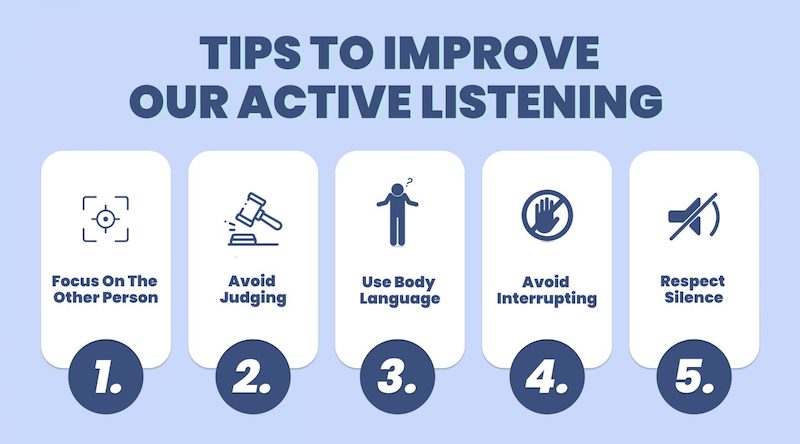Active listening is a crucial skill that enhances communication by focusing not just on hearing, but on fully comprehending and responding to what others are saying. In today’s fast-paced world, where communication often feels rushed or superficial, mastering active listening can set you apart in both personal and professional relationships.
Why Active Listening Matters
Active listening is foundational to building trust, resolving conflicts, and fostering empathy. It involves giving your full attention to the speaker, understanding their perspective, and responding thoughtfully. This skill is invaluable in workplaces, friendships, and family dynamics, where effective communication is essential for success and harmony.
Key Techniques for Mastering Active Listening
1. Paying Attention
The first step in active listening is to eliminate distractions and focus entirely on the speaker. This means putting away your phone, maintaining eye contact, and giving non-verbal cues like nodding or leaning forward to show engagement. By demonstrating that you’re fully present, you create a conducive environment for open and honest communication.
2. Showing Empathy
Empathy is at the heart of active listening. It involves understanding not just the words spoken but also the emotions behind them. You can show empathy by paraphrasing the speaker’s words, acknowledging their feelings, and validating their experiences. This helps to build rapport and trust, making the speaker feel heard and understood.
3. Asking Clarifying Questions
To ensure you’ve understood the speaker’s message correctly, ask clarifying questions. This demonstrates your interest in understanding their perspective and allows them to elaborate on their thoughts. Open-ended questions encourage deeper conversation and help uncover underlying concerns or motivations that may not be immediately apparent.
Benefits of Mastering Active Listening
Mastering active listening yields numerous benefits, both professionally and personally. It improves communication efficiency, reduces misunderstandings, and enhances problem-solving abilities. In professional settings, active listeners are perceived as more competent and trustworthy, leading to improved teamwork and leadership effectiveness.
In Professional Settings
In business and organizational contexts, active listening can lead to better client relationships, increased sales, and improved customer satisfaction. It enables you to anticipate client needs, address concerns proactively, and tailor solutions that meet their expectations. Moreover, active listening fosters a positive work environment where employees feel valued and understood, boosting morale and productivity.

In Personal Relationships
Active listening is equally vital in personal relationships. It strengthens emotional bonds, resolves conflicts amicably, and cultivates deeper connections with friends, family, and romantic partners. By listening actively, you demonstrate respect for others’ viewpoints and nurture healthier, more fulfilling relationships based on mutual understanding and support.
Practicing Active Listening in Everyday Life
1. Practice Mindfulness
Mindfulness techniques, such as deep breathing and staying present in the moment, can enhance your ability to listen actively. Practice being mindful during conversations by focusing on the speaker’s words without letting your mind wander or pre-judging their message.
2. Reflect on Your Conversations
After conversations, take time to reflect on how well you listened actively. Identify areas for improvement, such as maintaining eye contact or avoiding interruptions, and commit to implementing these changes in future interactions.
3. Seek Feedback
Ask trusted colleagues, friends, or family members for feedback on your listening skills. Their insights can provide valuable perspectives and help you identify blind spots or habits that may hinder effective communication.
Conclusion
Mastering active listening is a journey that requires patience, practice, and a genuine commitment to understanding others. By honing this essential skill, you can enhance your professional reputation, strengthen personal relationships, and contribute to a more harmonious and productive environment. Embrace active listening as a cornerstone of effective communication, and reap the rewards of deeper connections and enriched experiences in all aspects of your life.
For related articles, feel free to click this link for a piece on local government communication training: https://vbctraining.com.au/local-government-communication-training/
